Overview
The article titled "10 Essential Books PTSD Survivors Should Read for Healing" highlights the profound role literature plays in the recovery journey for individuals affected by PTSD. It gently emphasizes key books that offer practical strategies, insights, and coping mechanisms.
Have you ever felt overwhelmed by your past? These resources can significantly aid survivors in understanding their experiences and fostering healing through various therapeutic approaches.
As we explore this further, you may find that these readings not only provide comfort but also empower you on your path to recovery.
Introduction
In a world where trauma affects millions, have you ever felt overwhelmed by your past? The journey to recovery often seems daunting and isolating. The Emerald Couch, a specialized psychotherapy practice in Denver, Colorado, stands as a beacon of hope for those grappling with trauma and anxiety disorders. By embracing a holistic approach, this practice not only addresses the wounds of the past but also nurtures personal growth and empowerment.
With a focus on whole-person care, clients are gently guided through tailored therapeutic experiences that prioritize their unique needs and aspirations. As the prevalence of trauma continues to rise, the importance of effective, compassionate therapeutic interventions cannot be overstated. Resources like The Emerald Couch are essential for fostering resilience and healing in individuals seeking to reclaim their lives. Together, we can embark on this journey toward healing and hope.
The Emerald Couch: Holistic Psychotherapy for Trauma Recovery
The Emerald Couch, located in Denver, Colorado, is a dedicated psychotherapy practice focused on alleviating distress and anxiety disorders in adults. By embracing a holistic approach, the practice strives to help clients recalibrate, recover, and heal from their past experiences. This methodology emphasizes whole-person care, recognizing that individuals are more than just their histories, and promotes personal growth through expert therapeutic practices.
Clients at The Emerald Couch enjoy flexible options, including face-to-face counseling and telehealth sessions, ensuring accessibility and convenience. The therapists adhere to a structured process that begins with comprehensive assessments, leading to personalized treatment planning and education. This tailored approach gently guides clients toward achieving their mental health goals effectively, particularly for those who may feel overwhelmed or burnt out, like overachievers who struggle to prioritize their needs.
Have you ever felt overwhelmed by your past? Recent statistics from 2025 reveal that approximately 70% of adults in the U.S. experience trauma at some point in their lives, highlighting the critical need for effective therapeutic interventions. The practice's commitment to high-quality, evidence-based care is further supported by research indicating that the qualities of counselors significantly predict positive outcomes in therapeutic relationships. This underscores the importance of a supportive environment in fostering healing and growth, which The Emerald Couch prioritizes through its compassionate approach.
Case studies, particularly those found in books about PTSD and veterans, illustrate that specialized treatment programs are vital for healing, especially for individuals who have faced combat. The Emerald Couch addresses similar recovery needs by creating a secure and inclusive environment where clients can explore their mental health requirements. As Jodie Gale, an Eco-Psycho-Spiritual Psychotherapist, beautifully states, "Collaborating with my therapist, I have been able to heal and distance myself from my early childhood pain and distress. I learnt how to nurture and be true to myself." Through this compassionate approach, The Emerald Couch serves as a vital resource for individuals prioritizing their mental well-being.
The Body Keeps the Score: Brain, Mind, and Body in the Healing of Trauma by Bessel van der Kolk
In 'The Body Keeps the Score,' Bessel van der Kolk gently explores the profound ways emotional scars reshape both the body and mind. His research highlights that approximately 3.8% of individuals exposed to natural disasters develop PTSD, underscoring the widespread impact of trauma.
Have you ever felt overwhelmed by your past? Van der Kolk presents innovative treatments that emphasize body awareness, including yoga and mindfulness, which are essential for effective healing. Mindfulness methods like meditation and conscious breathing improve emotional regulation and self-awareness, making them vital elements of healing approaches.
This book serves as an essential resource for PTSD survivors, clarifying the scientific foundations of distress while providing practical strategies for recovery, including mindfulness practices that can be seamlessly incorporated into daily life with books on PTSD. By grasping the relationship between distress and brain function, readers can more effectively manage their recovery paths.
As van der Kolk states, "Psychologists usually try to help people use insight and understanding to manage their behavior," emphasizing the importance of awareness in the healing process.
In addition to this, comprehending the intersection between post-traumatic stress disorder and anxiety disorders, as detailed in various books on PTSD, can guide treatment approaches that tackle both issues efficiently, establishing this work as a fundamental part of trauma recovery literature.
Loving Someone with PTSD: A Practical Guide to Understanding and Connecting with Your Partner by Aphrodite T. Matsakis
Loving Someone with Post-Traumatic Stress Disorder: A Practical Guide to Understanding and Connecting with Your Partner by Aphrodite T. Matsakis is one of the important books on PTSD, serving as an essential guide for partners of individuals navigating the complexities of this condition. This book compassionately explores the symptoms linked to post-traumatic stress disorder, and it is one of the essential books on PTSD that offers practical strategies to enhance communication and emotional support. Have you ever felt overwhelmed by your partner’s experiences? Matsakis emphasizes the necessity of establishing a safe and nurturing environment, which is crucial for fostering understanding and connection between partners. This approach resonates deeply with the therapeutic philosophy at The Emerald Couch, where creating a trusting environment is prioritized to facilitate personal growth and healing.
Considering that roughly 3.8% of people exposed to natural disasters experience post-traumatic stress disorder, the insights offered are especially pertinent for those in relationships impacted by trauma. By employing effective communication strategies, partners can greatly enhance their relationship dynamics, ultimately assisting in the healing process for both individuals involved. As Melinda Smith wisely advises, it is important to set boundaries and be realistic about what you’re capable of giving. Furthermore, understanding the connection between domestic violence and post-traumatic stress disorder is essential, as the intensity and length of such experiences can significantly affect the onset of the condition.
Additionally, PTSD-related anxiety can hinder concentration and increase agitation, making effective communication strategies even more vital in supporting partners through their recovery. Incorporating mindfulness techniques, as highlighted in counseling at The Emerald Couch, can also improve emotional regulation and self-awareness, further assisting partners in managing their relationships with individuals impacted by trauma.
Moreover, The Emerald Couch employs a collaborative treatment planning process, ensuring that both partners are involved in setting goals and evaluating progress. Cognitive Processing Therapy (CPT) is also utilized as an organized method for recovery from psychological distress, helping individuals process experiences and form healthier thought patterns. As you consider these insights, remember that seeking support can be a powerful step towards healing for both you and your partner.
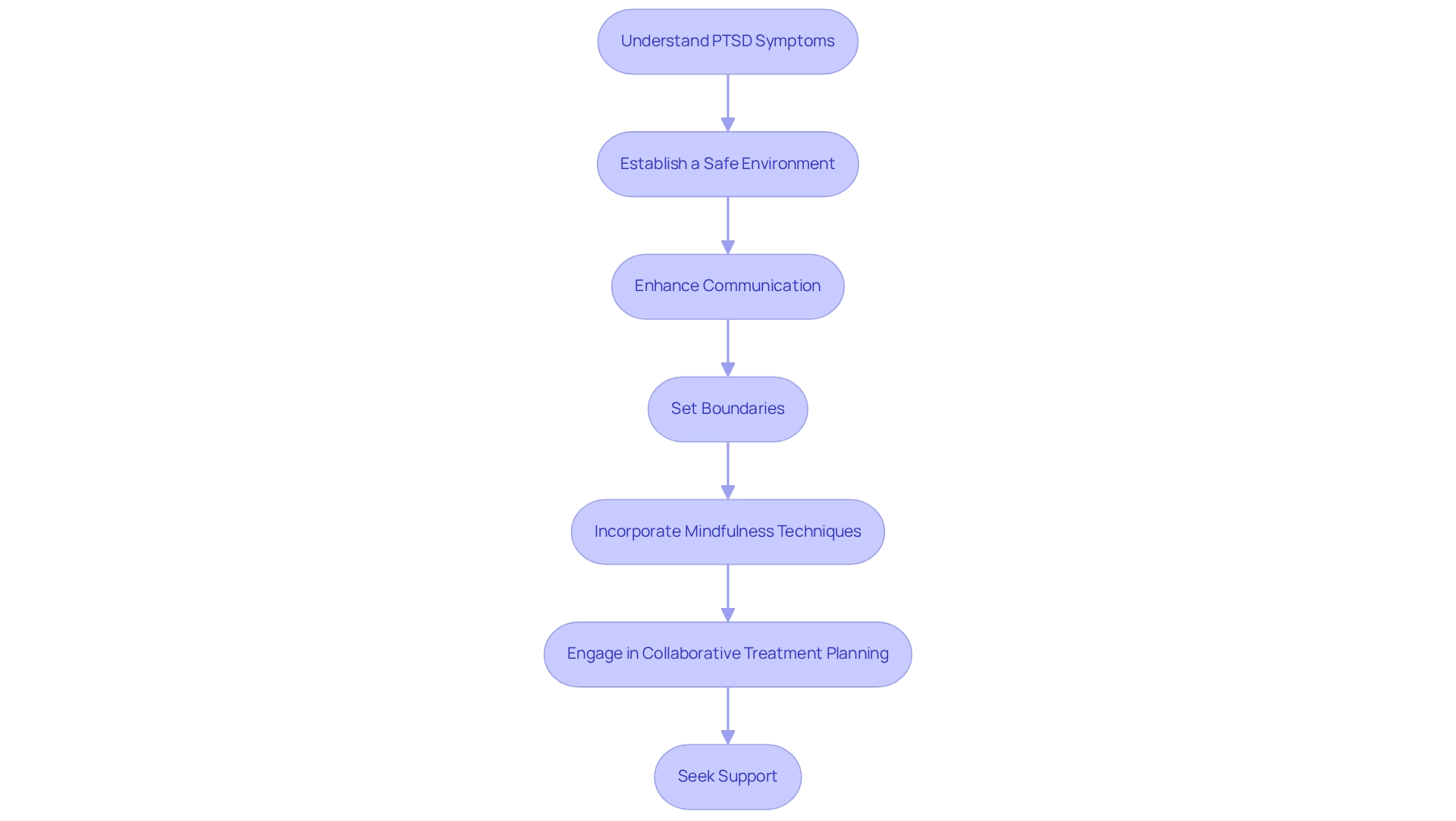
The Complex PTSD Workbook: A Mind-Body Approach to Healing from Trauma by Dr. Arielle Schwartz
Dr. Arielle Schwartz's 'The Complex PTSD Workbook' is among the books on PTSD that offer a comprehensive mind-body approach to recovery from psychological distress, specifically tailored for those navigating the complexities of stress disorders. This workbook is rich with exercises and prompts designed to foster self-reflection and emotional healing, making it an invaluable resource for individuals who have endured prolonged trauma.
At The Emerald Couch, we deeply appreciate the effectiveness of mind-body therapies in addressing PTSD symptoms. Research shows that these approaches can significantly enhance emotional regulation and overall well-being. For example, the installation phase of EMDR therapy plays a crucial role in anchoring new, positive beliefs about oneself, a fundamental aspect of Schwartz's methodology. By integrating exercises that support this anchoring process, the workbook empowers readers to reshape their self-perception and enrich their healing journey.
Many experts emphasize the vital role of workbooks and books on PTSD in recovery, with numerous therapists endorsing their use as a complementary resource alongside traditional therapy. The exercises in 'The Complex PTSD Workbook' not only foster personal insight but also empower individuals to reclaim their emotional and physical health. As Ebonee Davis poignantly expresses, "People are afraid to heal because their entire identity is centered around the suffering they’ve experienced." This sentiment captures the struggle many face when overcoming adversity, underscoring the workbook's essential role in guiding them through their recovery.
Case studies illustrate that individuals who engage with mind-body techniques often experience a profound transformation in their ability to navigate daily life post-trauma. The case study titled 'Living with the Aftermath of Trauma' reveals how sharing experiences can lead to validation and support—key elements for recovery. By connecting these insights to the workbook's exercises, readers can appreciate the practical applications of the discussed strategies.
It is also important to recognize that stress-related illnesses can stem from the physical health risks associated with untreated C-PTSD. This highlights the necessity of addressing trauma through resources like 'The Complex Trauma Workbook,' which provides essential tools for healing.
Current trends in self-help materials for trauma indicate a growing preference for workbooks that incorporate mind-body techniques, signaling a shift toward holistic recovery practices. Dr. Schwartz's latest strategies emphasize the integration of physical awareness with emotional processing, equipping readers with practical tools to enhance their healing journey.
If you are curious about how 'The Complex Trauma Workbook' can support your healing journey, we warmly invite you to reach out to The Emerald Couch for a complimentary 30-minute consultation. Our therapists are ready to assist you in finding your path to healing. In summary, 'The Complex PTSD Workbook' is one of the essential books on PTSD, serving as a crucial resource for individuals affected by distress and offering innovative strategies that resonate with contemporary understandings of PTSD recovery.
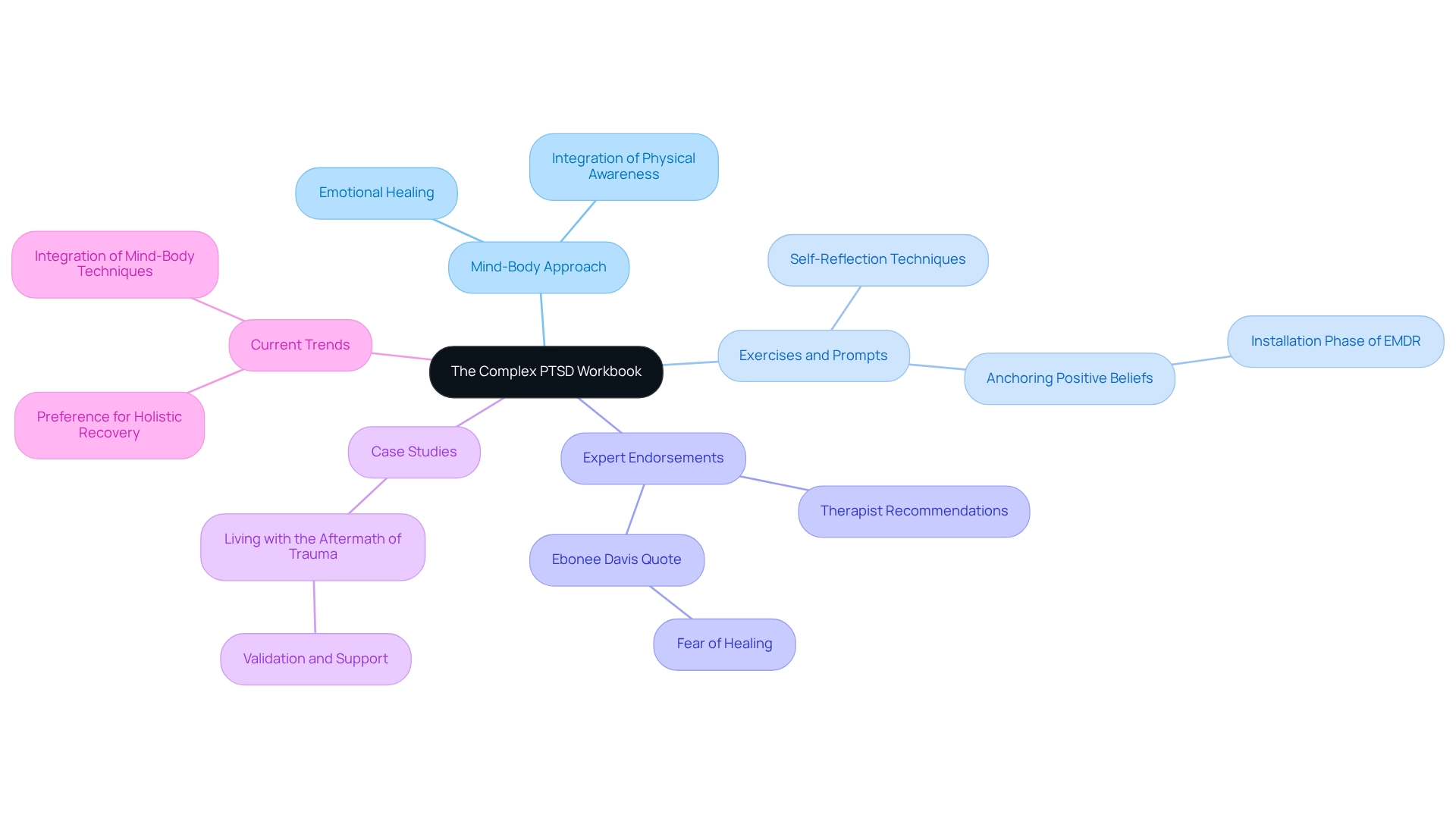
Transformed by Trauma: A Guide to Post-Traumatic Growth by Richard G. Tedeschi and Bret A. Moore
Transformed by Adversity: A Guide to Post-Traumatic Growth by Richard G. Tedeschi and Bret A. Moore invites readers on a transformative journey of post-traumatic growth, highlighting the importance of books on PTSD. It illustrates how individuals can emerge from distress with newfound strength and resilience. Through compelling real-life stories and research findings, the authors underscore the potential for personal transformation following traumatic experiences. This book, along with other books on PTSD, serves as a beacon of hope for those navigating their recovery journey, highlighting the significance of resilience and self-compassion in overcoming adversity.
Have you ever felt overwhelmed by your past? Tedeschi's insights reveal that trauma can be a catalyst for profound change, encouraging you to view your struggles as opportunities for growth and purpose. As Mattheu Ricard notes in his book 'Happiness,' some would call it 'persistent joy,' resonating with the themes of resilience discussed here.
Moreover, the non-linear aspect of healing, emphasized in the case study 'Non-linear Nature of Trauma Healing' by Jasmin Lee Cori, demonstrates that the process involves both advancement and obstacles. As we explore this further, incorporating recent findings on post-traumatic growth, the authors provide a roadmap for individuals seeking to turn their pain into a powerful narrative of recovery and empowerment through various books on PTSD.
Mindfulness techniques, such as breath awareness and body scans, can enhance this journey by promoting emotional regulation and self-awareness. These practices enable survivors to navigate their experiences with greater clarity and purpose.
With access to over 6,500 top-selling titles summarized in just 15 minutes via platforms like Blinkist, you can effortlessly delve into these transformative ideas and incorporate them into your own recovery journey.
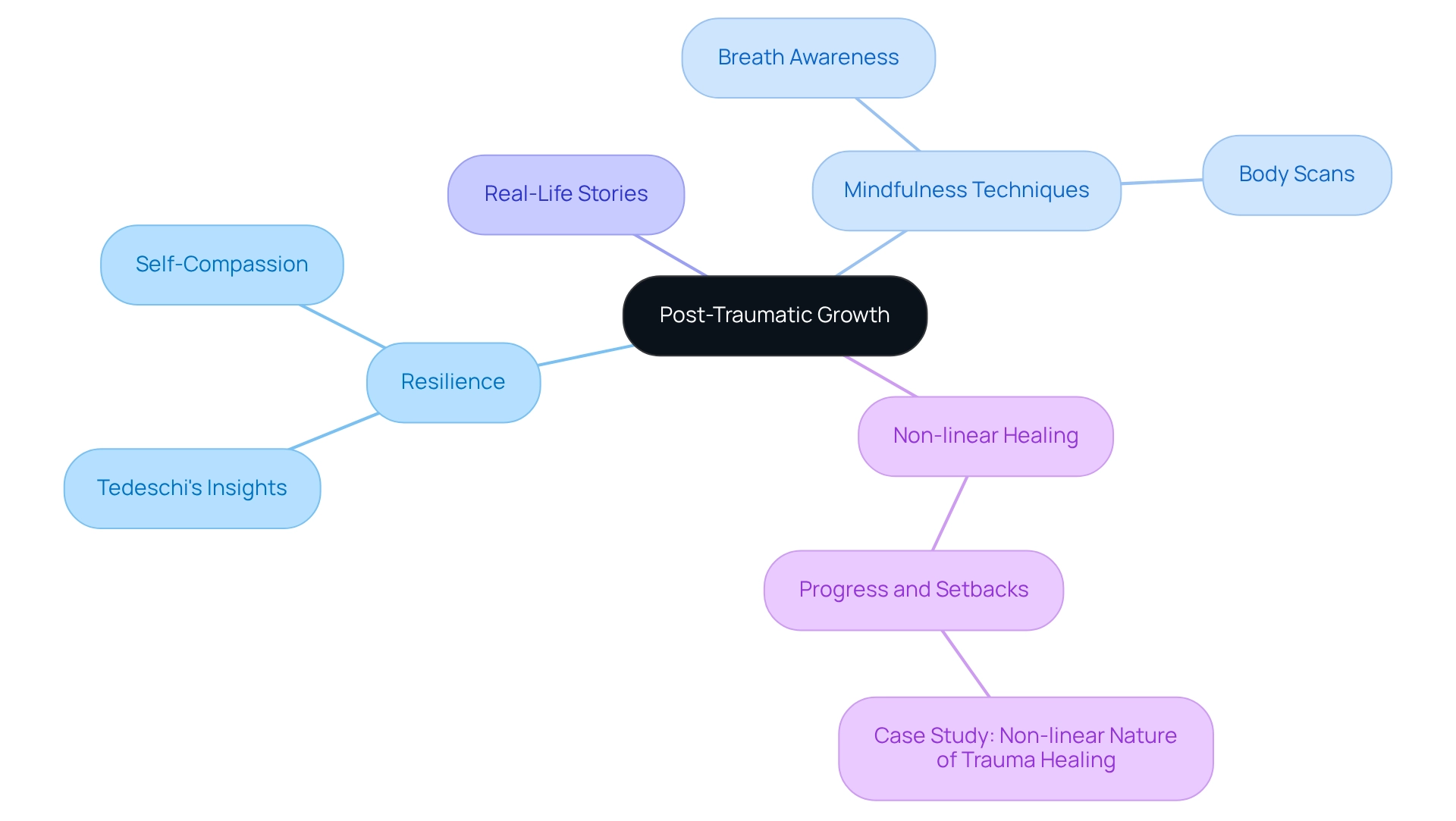
PTSD Solutions: A Guide to Coping with Trauma by Various Authors
PTSD Solutions is a collaborative work that offers a comprehensive array of coping strategies tailored for individuals navigating the complexities of trauma, including insights from various books on PTSD. This book on books PTSD delves into essential topics such as mindfulness, cognitive-behavioral techniques, and self-care practices, offering readers a toolkit to support their healing journey. Have you ever felt overwhelmed by your past? Mindfulness, in particular, has been shown to enhance emotional regulation and resilience, allowing individuals to cope more effectively with their experiences. At The Emerald Couch, mindfulness is incorporated into therapy sessions, assisting clients in developing awareness of their thoughts and emotions, which is essential for personal development and emotional stability.
Cognitive-behavioral techniques further empower individuals by aiding them in recognizing and confronting negative thought patterns, promoting a more optimistic perspective on healing. The practice of mindfulness not only helps in identifying these patterns but also motivates individuals to decelerate and make deliberate decisions regarding their reactions, improving their overall mental well-being. As we explore this further, the real-world uses of these strategies are clear in community support initiatives, where participation in support groups and online forums fosters a sense of belonging and mutual understanding among individuals with PTSD, as discussed in various books on PTSD. Such environments not only improve rehabilitation but also offer invaluable peer support, reinforcing the idea that restoration is often a shared journey. As the saying goes, 'Peace is not the absence of conflict, but the ability to cope with it,' emphasizing the significance of resilience in the healing process.
The effectiveness of these coping strategies is emphasized by recent statistics indicating that individuals who actively engage in mindfulness practices report significant improvements in their ability to manage trauma-related symptoms. Expert opinions highlight the transformative power of these techniques, with mental health professionals advocating for their integration into traditional therapeutic approaches. Furthermore, workshops and retreats centered on wellness can enhance these strategies, providing additional assistance for those on their path to restoration. By providing a range of methods, Solutions for trauma empowers readers to uncover the strategies that resonate most with their individual healing journeys, emphasizing that recovery is a personal and evolving process, as highlighted in various books on PTSD. As Mary Anne Radmacher wisely said, 'I will try again tomorrow,' reminding us of the importance of perseverance in the face of challenges.
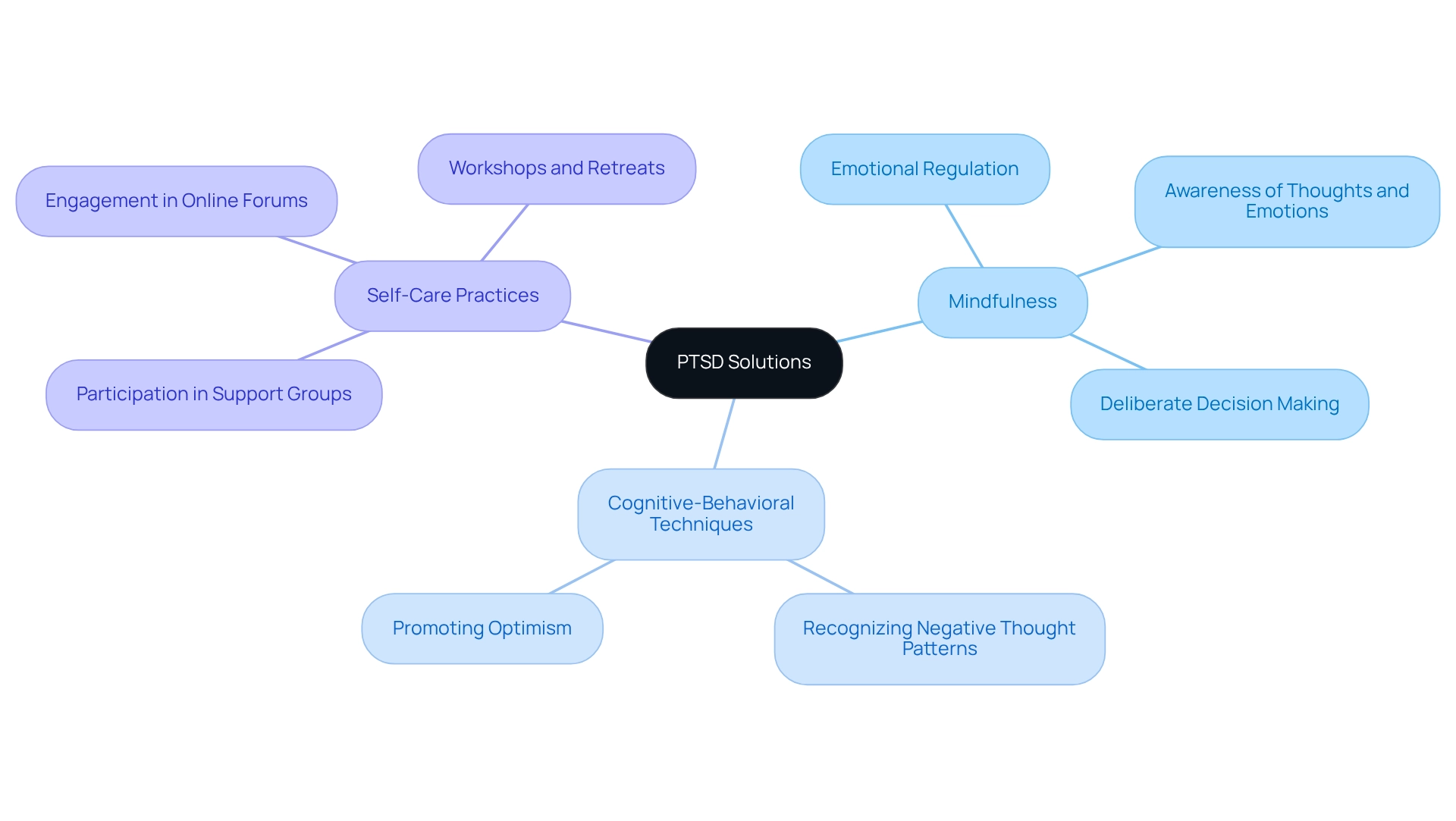
PTSD and Relationships: Loving Someone with PTSD by Tim L. Gardner
In 'Books PTSD and Relationships,' Tim L. Gardner explores the intricate dynamics faced by partners of individuals living with post-traumatic stress. This book offers essential strategies for navigating these challenges, emphasizing the vital roles of empathy and communication. Gardner highlights that fostering an environment of understanding is crucial not only for the trauma survivor's well-being but also for the emotional health of their partner.
Mindfulness practices, such as breath awareness and body scans, can play a significant role in this journey, helping both partners stay present and engaged in their interactions. With approximately 3.5% of the U.S. population affected by post-traumatic stress disorder each year, the implications are profound, impacting millions of relationships. The books on PTSD offer practical advice and serve as a valuable resource for those wishing to support their loved ones while also attending to their own emotional needs.
Real-life examples illustrate how effective communication can bridge gaps in understanding, ultimately strengthening the relationship. Gardner's insights emphasize the importance of patience and kindness, reminding readers that healing is a gradual process enriched by mutual support and compassion. Incorporating mindfulness techniques can further enhance this journey, allowing partners to navigate their emotions and reactions more effectively.
As Patricia Eden, author of books on PTSD, notes in PTSDWifey, 'Reading this book will provide you with a fresh viewpoint and serve as a crucial turning point in your role regarding your partner’s trauma and marriage.' Additionally, recognizing that anxiety stemming from post-traumatic stress disorder can hinder focus and increase restlessness is essential for partners, as it highlights the challenges they may face. This underscores the important notion that recovery from trauma requires self-kindness, serving as a gentle reminder for both partners in the relationship.
Trauma PTSD Recovery Coping Skills and Mindfulness Workbook by Various Authors
The 'Trauma Recovery Coping Skills and Mindfulness Workbook' is one of the essential books on PTSD, serving as a valuable ally for those navigating the intricate landscape of post-traumatic stress. This comprehensive guide presents a variety of exercises from books on PTSD that are designed to help manage symptoms effectively, including mindfulness practices, coping strategies, and self-care tips. By empowering readers to actively engage in their healing journey, the workbook provides a structured path toward restoration.
Have you ever felt overwhelmed by your past? Recent trends in mindfulness practices underscore their crucial role in recovery from distress. Research suggests that early intervention and ongoing self-care are vital for managing traumatic stress. For instance, meditation has shown to reduce stress, enhance cognitive abilities, and create a safe space for addressing emotional pain—elements that are essential for anyone facing daily challenges related to distress. This workbook incorporates such meditation practices, allowing users to experience these benefits firsthand.
At The Emerald Couch, mindfulness is a cornerstone of therapy, particularly within frameworks like Cognitive Processing Therapy (CPT) and Dialectical Behavioral Therapy (DBT). These approaches highlight the significance of mindfulness in fostering emotional regulation and personal growth, making it an indispensable part of the therapeutic process. Expert opinions reinforce the value of these coping skills. Dr. Richa Shree, a senior psychologist at The Emerald Couch, shares, "My approach integrates evidence-based practices with compassionate care, ensuring that each individual receives the support they need to heal and thrive." This workbook aligns seamlessly with such methodologies, providing practical tools that nurture resilience and personal development.
Incorporating mindfulness practices not only aids in symptom management but also cultivates a deeper understanding of one’s emotional landscape, making it an essential addition to any trauma survivor’s healing toolkit, as highlighted in many books on PTSD. Furthermore, leveraging expert resources, like those offered at The Emerald Couch, can significantly enhance the effectiveness of the workbook’s activities, reinforcing that it is part of a broader healing strategy.
To embark on this journey, consider scheduling a free 30-minute consultation with our compassionate team at The Emerald Couch. You can reach us at info@emeraldcouch.com or call (720) 707-1383. We are here to support you on your path to healing.
Trauma and Addiction: A Guide to Understanding and Healing by Various Authors
The complex connection between psychological distress and substance use disorders is thoroughly examined in 'Trauma and Addiction: A Guide to Understanding and Healing.' This essential resource delves into how traumatic experiences can precipitate addiction, offering readers a nuanced understanding of their struggles. Have you ever felt overwhelmed by your past? Recent studies suggest that individuals with a background of distress are considerably more prone to develop substance use disorders, underscoring the necessity of tackling both matters simultaneously in rehabilitation efforts.
Experts stress that healing from addiction related to distress demands a comprehensive strategy. Strategies such as establishing a supportive network of friends and family can provide invaluable encouragement and understanding during the recovery process. This aligns with findings that support systems play a crucial role in fostering resilience and promoting healing.
Real-life examples illustrate the transformative power of therapy in addressing the roots of addiction. For example, individuals who practice informed care, including therapeutic approaches like dialectical behavioral therapy (DBT) and cognitive behavioral therapy (CBT), frequently report notable enhancements in their mental health, allowing them to envision a life free from past burdens. This is particularly relevant in the context of The Emerald Couch, where a supportive atmosphere is cultivated, allowing clients to explore their mental health needs safely. The practice exemplifies the importance of creating a nurturing environment that fosters healing through mindfulness techniques, such as breath awareness and body scans, which can enhance emotional regulation and personal growth.
Statistics reveal that approximately 7.9% of adults aged 26 or older reported past-month marijuana use in 2019. This statistic highlights the prevalence of substance use as a coping strategy for distress, illustrating how many individuals resort to drugs to handle their emotional pain. As Gabor Maté insightfully notes, much of what we perceive as personality may actually be coping mechanisms developed in response to childhood experiences. This viewpoint emphasizes the importance of tackling deep-seated issues to enable authentic healing.
Carrie Fisher's thoughts on her drug use as a way to simplify her emotional experience further underscore the intricate relationship between distress and addiction. Her narrative acts as a touching reminder of how people frequently pursue solace through substances, highlighting the necessity for empathetic comprehension in the healing process. In conclusion, 'Trauma and Addiction' serves as an essential resource, along with other books on PTSD, for those aiming to grasp the intricacies of their dependence in connection to their history of distress. By offering insights and practical approaches for healing, including mindfulness techniques, it enables survivors to navigate their healing journey with greater awareness and support.
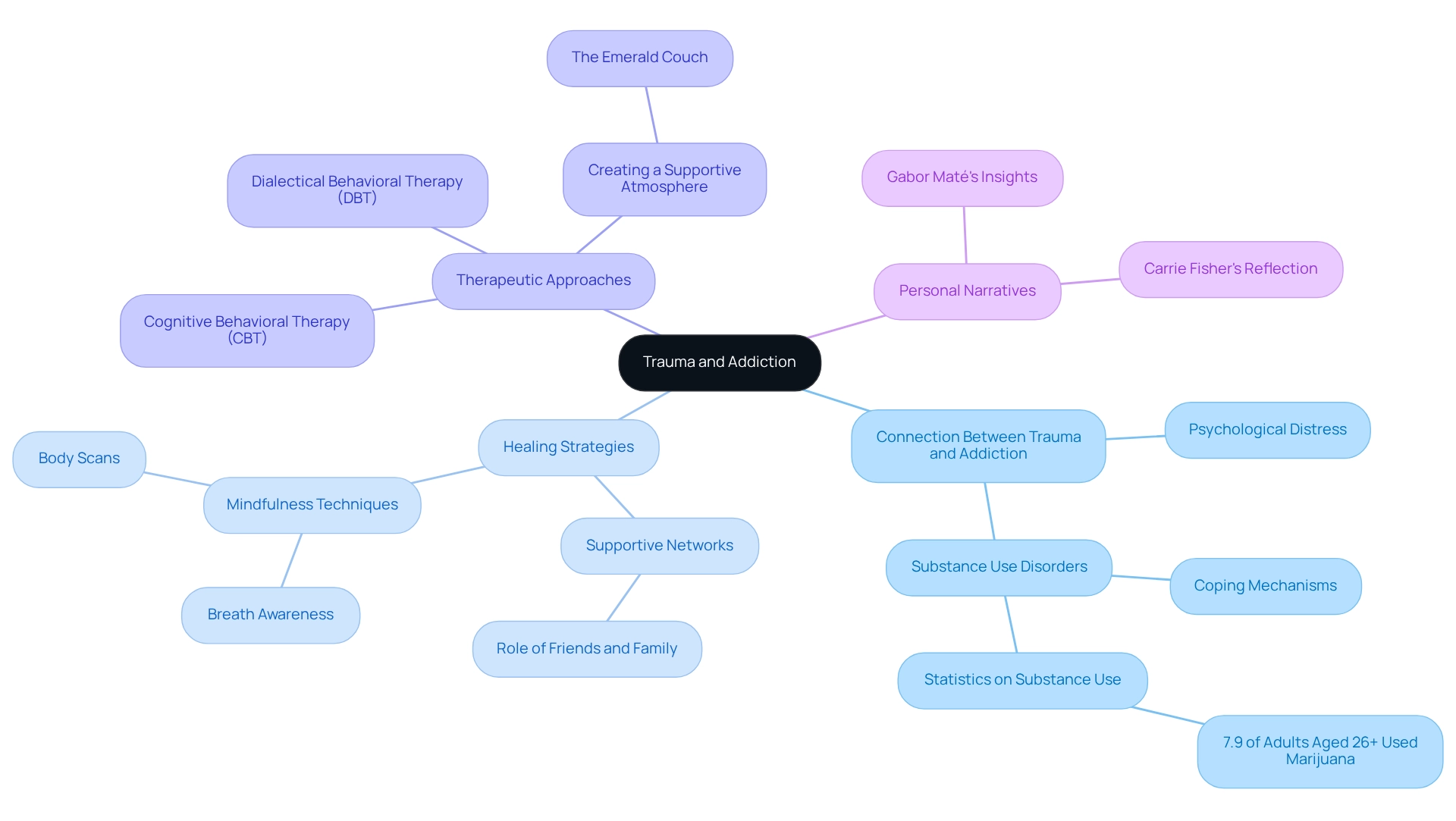
Healing Developmental Trauma: How to Make Sense of Your Past and Create a New Future by Various Authors
Healing Developmental Trauma: How to Make Sense of Your Past and Create a New Future by Various Authors explores the profound effects of early traumatic experiences on individuals' lives, offering a wealth of practical tools and insights for recovery. Understanding the origins of distress is crucial for promoting a healthier future. Have you ever felt overwhelmed by your past? Statistics reveal that emotional abuse affects 36.5% of individuals in Wyoming, with 30.9% of households reporting mental illness, and an ACE score of 36.0 for adults in the state. This highlights the urgency of addressing developmental challenges.
As we delve deeper, Bessel A. van der Kolk's research underscores the challenges faced by adult survivors, particularly in forming healthy relationships and achieving autonomy. This emphasizes the necessity for targeted therapeutic interventions such as:
- Dialectical Behavioral Therapy (DBT)
- Acceptance and Commitment Therapy (ACT)
Recent insights from experts like Gabor Maté stress the importance of emotional competence. The inability to express emotions can lead to chronic stress and illness.
Beverly Engel poignantly asserts, 'You can't think yourself into new ways of acting; You only can act yourself into new ways of thinking.' This highlights the need for actionable measures in the recovery process. Mindfulness practices, such as meditation and mindful breathing, can significantly enhance emotional regulation, stress management, and self-awareness. These practices provide trauma survivors with tools to observe their thoughts and feelings without judgment.
This book serves as a vital resource for those seeking to navigate their complex emotional landscapes and implement effective healing strategies, particularly in the context of books on PTSD. To apply these insights, readers are encouraged to actively engage in therapeutic practices that promote emotional expression and self-awareness. This paves the way for recovery and personal growth. Remember, you are not alone on this journey, and taking the first step can lead to profound change.
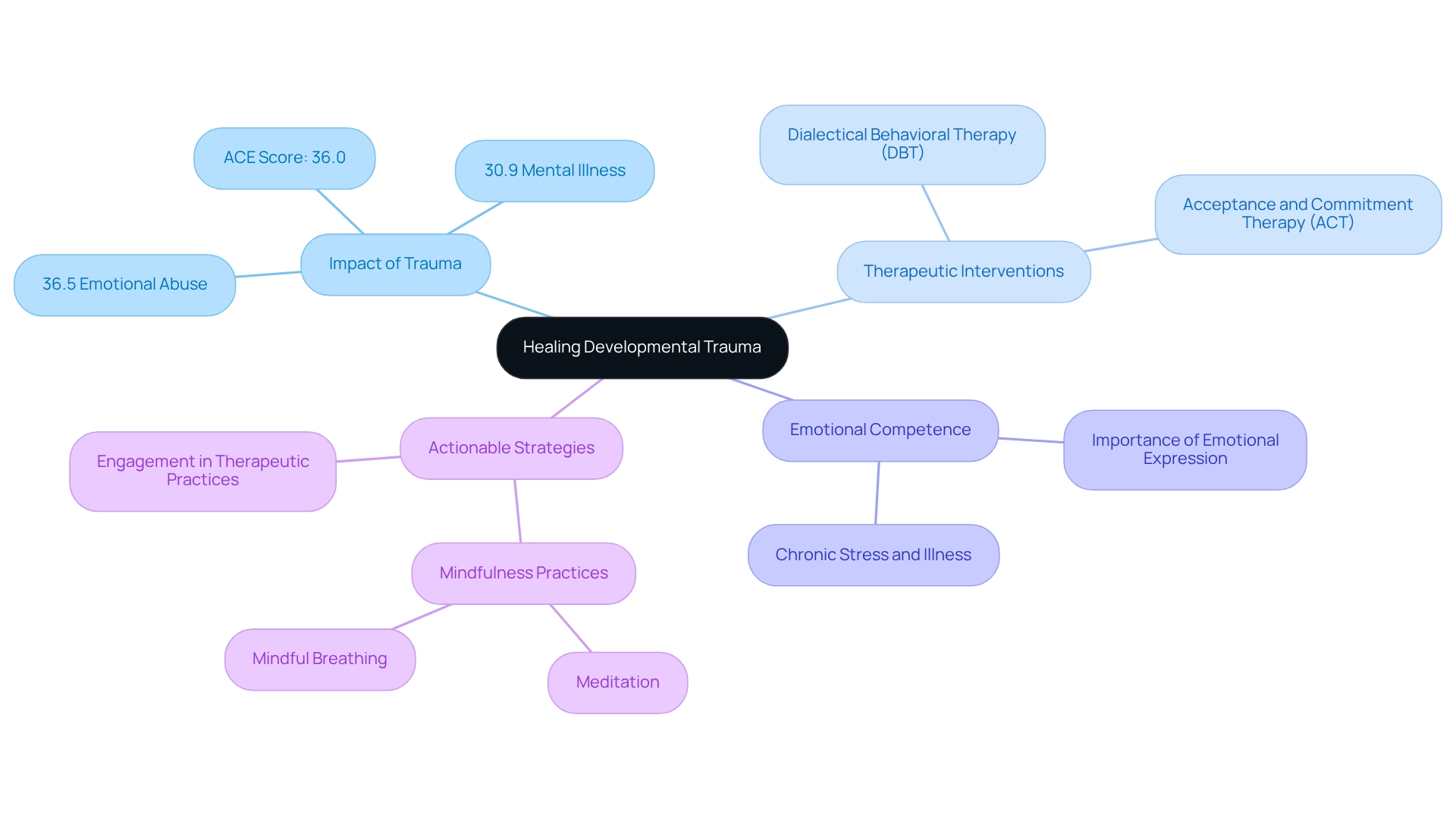
Conclusion
The Emerald Couch serves as an essential resource for those navigating the intricate challenges of trauma and anxiety disorders. By embracing a holistic approach, this specialized psychotherapy practice not only confronts the difficulties of the past but also nurtures personal growth and resilience. Through customized therapeutic experiences and a steadfast commitment to whole-person care, clients are empowered to reclaim their lives and prioritize their mental well-being.
As we consider the widespread impact of trauma, the significance of compassionate, evidence-based therapeutic interventions becomes increasingly evident. The integration of mindfulness practices, cognitive-behavioral techniques, and collaborative treatment planning enriches the recovery process, allowing individuals to explore their emotional landscapes in a supportive environment. The insights drawn from various expert resources highlight the necessity of addressing both trauma and its associated challenges, such as PTSD and addiction, in a comprehensive manner.
Have you ever felt overwhelmed by your past? As individuals embark on their healing journeys, the importance of perseverance and self-compassion cannot be overstated. The Emerald Couch is here to support those seeking to transform their pain into a narrative of strength and empowerment. By prioritizing mental health and harnessing the power of therapeutic resources, clients can cultivate resilience and navigate their paths toward healing with greater clarity and intention.
Frequently Asked Questions
What is The Emerald Couch?
The Emerald Couch is a dedicated psychotherapy practice located in Denver, Colorado, focused on alleviating distress and anxiety disorders in adults through a holistic approach that promotes personal growth and healing.
What types of therapy does The Emerald Couch offer?
The Emerald Couch offers flexible therapy options, including face-to-face counseling and telehealth sessions, ensuring accessibility and convenience for clients.
How does The Emerald Couch tailor its therapy for clients?
The therapy process at The Emerald Couch begins with comprehensive assessments, leading to personalized treatment planning and education, guiding clients toward their mental health goals effectively.
What is the significance of trauma in the context of therapy at The Emerald Couch?
Recent statistics indicate that approximately 70% of adults in the U.S. experience trauma at some point in their lives, highlighting the need for effective therapeutic interventions, which The Emerald Couch addresses through its compassionate and supportive environment.
How does The Emerald Couch support clients dealing with PTSD?
The Emerald Couch creates a secure and inclusive environment for clients to explore their mental health needs, drawing on specialized treatment programs that are vital for healing, especially for individuals who have faced trauma.
What role do therapists play in the healing process at The Emerald Couch?
The therapists at The Emerald Couch prioritize creating a supportive environment, as research indicates that the qualities of counselors significantly predict positive outcomes in therapeutic relationships.
What are some innovative treatments mentioned in connection with trauma recovery?
Innovative treatments for trauma recovery include body awareness practices, yoga, and mindfulness techniques, which are essential for effective healing.
How does The Emerald Couch involve partners in the treatment process for those with PTSD?
The Emerald Couch employs a collaborative treatment planning process, ensuring that both partners are involved in setting goals and evaluating progress, which enhances the healing process for both individuals.
What is Cognitive Processing Therapy (CPT) and how is it used at The Emerald Couch?
Cognitive Processing Therapy (CPT) is an organized method for recovery from psychological distress used at The Emerald Couch to help individuals process their experiences and form healthier thought patterns.
Why is establishing a safe environment important in therapy?
Establishing a safe and nurturing environment is crucial for fostering understanding and connection between partners, which resonates with the therapeutic philosophy at The Emerald Couch and facilitates personal growth and healing.




